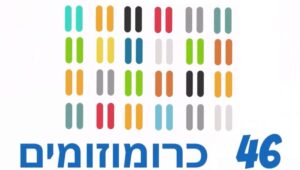 הדוקטורנטיות אולפת אבוליל-זועבי וחן גפני-אמסלם פיתחו כלים דיגיטליים לשיפור רמת הידע וקבלת החלטות מושכלות בתהליכי ייעוץ גנטי. בעקבות הצלחת הניסוי הראשוני יחל בקרוב פיילוט נרחב בשרותי בריאות כללית
הדוקטורנטיות אולפת אבוליל-זועבי וחן גפני-אמסלם פיתחו כלים דיגיטליים לשיפור רמת הידע וקבלת החלטות מושכלות בתהליכי ייעוץ גנטי. בעקבות הצלחת הניסוי הראשוני יחל בקרוב פיילוט נרחב בשרותי בריאות כללית
אי ודאות מדעית בתקשורת הישראלית בתקופת הקורונה
בתאריך ה-09.01.2022 הציגה המאסטרנטית אורלי וולפסון את סמינר התזה שלה בהצלחה רבה.
מצורף קישור להקלטה
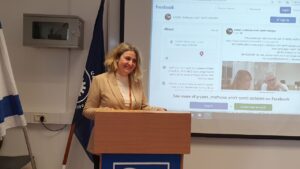
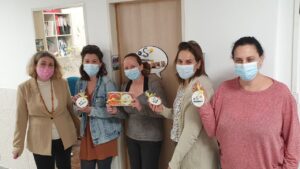
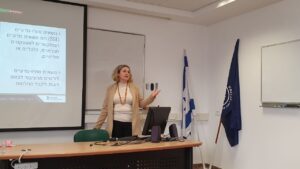
New chapter
Excited to model our new chapter by Yael Barel-Ben David and Ayelet Baram-Tsabari:
“Professional development in science communication for practicing scientists: the role of science communication training programs in shaping participating scientists’ skills”.
Happy to be part of the 1st Edition (may many will follow) of The Routledge Handbook of Scientific Communication, Edited By Cristina Hanganu-Bresch, Michael J. Zerbe, Gabriel Cutrufello, and Stefania M. Maci.
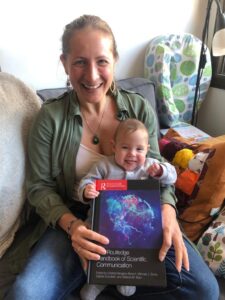
Your Chance of Finding Quality Scientific Information on Google Depends on the Language You Search In
We are often told that nowadays, all the world’s knowledge is available at our fingertips – just a quick Google search away. But what happens when users search for information in their own language? For example, when searching for a scientific term, do search engines provide English-, Hebrew- and Arabic-speaking students with the same level of access to quality scientific information? This question is addressed by a new study, conducted at the Technion and recently published in Public Understanding of Science.
The study found that search results for terms in English are of better quality than those provided for equivalent terms in Hebrew and Arabic. Additionally, most of the differences between the languages pertained to pedagogical aspects of quality, that is, the extent to which the content was geared towards young users, rather than the scientific aspects, such as the accuracy of the content. Some of the largest differences between the languages were found for terms related to nutrition and metabolism, such as “carbohydrate,” “protein,” “enzyme” and “metabolism.”
These findings are based on the top Google Search results presented to users in Israel for 30 basic scientific terms in three languages: Hebrew, Arabic and English. The terms pertained to three scientific domains: biology, chemistry, and physics. Each search result’s overall quality was determined using scientific criteria, such as content accuracy, the author’s authority, and the use of sources; pedagogical criteria, such as references to everyday life and the quality of audiovisual materials; and criteria specific to online content, such as recency and interactivity.
According to Kawther Zoubi, who conducted the study as part of her masters’ thesis at the Technion’s Faculty of Education in Science and Technology, “these findings help us understand the digital divide and the social factors that affect our ability to develop science literacy. Our understanding of science depends on the environment we live in and the extent to which we have access to quality scientific information. This depends on our proficiency in different languages.”
Prof. Ayelet Baram-Tsabari of the Technion’s Faculty of Education in Science and Technology, who oversaw the study, added: “The scientific and educational communities must act to mitigate the digital divide. We all have the right to access quality scientific information in our language.”
The study was conducted by Kawther Zoubi, Dr. Aviv Sharon, and Prof. Ayelet Baram-Tsabari of the Technion’s Faculty of Education in Science and Technology, along with independent scholar Dr. Eyal Nitzany.
The study is available under an Open Access license (CC BY-NC 4.0) from Public Understanding of Science, published by SAGE Journals.
Zoubi, K., Sharon, A. J., Nitzany, E., & Baram-Tsabari, A. (2021). Science, maddá and ‘ilm: The language divide in scientific information available to internet users. Public Understanding of Science. Advance online publication. https://doi.org/10.1177/09636625211022975
Accompanying video: https://youtu.be/ZYTlIdUWxss
מפחדים ממתמטיקה: הישראלים לא מבינים את נתוני הקורונה
פרס ההשכלה הגבוהה לשנת תשפ״א
Pcst conference
The PCST conference is one of the most important conferences in science communication. This year it took place in an online format.
Six group members and alumni presented at the conference. Prof. Ayelet Baram-Tsabari presented a study on the scientific knowledge of sports fans and its impact on their decisions regarding the COVID-19 regulations, and a study on the public’s understanding of the mathematical aspects of the COVID-19 pandemic. Dr. Yael Barel-Ben David participated in a panel that dealt with communicating their own research: What do we need to know about the role of scientists and researchers in science communication?, Dr. Lea Taragin-Zeller presented a study on public engagement with science among religious minorities: Lessons from COVID-19, Dr. Aviv Sharon presented two studies: experts’ bounded engagement with publics: An interview-based study of online nutrition and vaccination outreach and How do individuals evaluate the trustworthiness of vaccine information on social Q&A platforms?, Dr. Yaela Golumbic presented a study on characterizing engagement in an environmental citizen science project and Yael Rozenblum presented a study on evidence for gendered engagement with posts authored by women scientists in social media
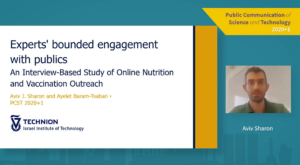
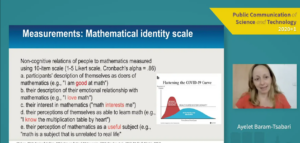
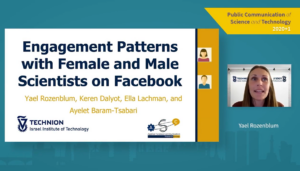
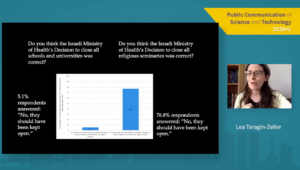
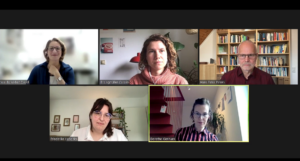
מחוברות באקדמיה
יועצות הנשיא להוגנות מגדרית מזמינות להשתתף באירוע משותף, מיוחד וראשון מסוגו, בו חברו יחדיו תשע אוניברסיטאות, לציון יום האישה הבינלאומי לשנת 2021.
באירוע תהיה חשיפה למגוון האנושי והמחקרי של נשים-חוקרות באוניברסיטאות בישראל. במושב המרכזי תהיינה הרצאות קצרות בסגנון TED של חוקרות מובילות באקדמיה הישראלית ולאחר מכן יתקיימו חדרי דיון במגוון תחומים.
האירוע מקוון, ללא עלות אולם מותנה בהרשמה מראש. ההרשמה תתאפשר לסגל אקדמי ומנהלי, לסטודנטיות ולסטודנטים.
הקהל הרחב מוזמן לצפות באירוע ברשתות החברתיות.
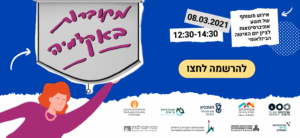
Religion, Race & Racism: Transnational Conversations Seminar Series
Event description:
From the rise of white Christian nationalism in the United States to
anti-immigration rhetoric against ‘Muslim refugees’ in Europe, the
imbrication of race, racism and religion extends across geographic
locations, social settings, and political contexts. As xenophobia and
discrimination surge around the globe, religion and race are often
conflated in everyday violence, yet their relationship is undertheorized
in scholarly research. This seminar series ‘Religion, Race and Racism:
Transnational Conversations’, brings emerging and senior scholars into
conversation. In doing so, we reject a single-issue approach to the
study of key social and political events, and push for an intersectional
approach to the study of race, racism and religion. By facilitating
conversations between leading scholars examining the relationship
between race and religion, this series offers divergent perspectives,
opposing views, and creative theorizations to offer fresh analytical
tools for an urgent area of study.
The first seminar “Encounters of Race, Religion and Biomedicine” will
take place on March 3 between 15:30 – 16:30, with Dr. Mwenza Blell
(University of Newcastle), Dr. Risa Cromer (Purdue University) and Dr.
Noah Tamarakin (Cornell University) and Dr. Lea Taragin Zeller
(Technion and Cambridge)
For the full seminar schedule and registration:
https://www.woolf.cam.ac.uk/research/conferences/seminar-series-religion-race-and-racism-transnational-conversations
הופכות את היוצרות Turning the Tables
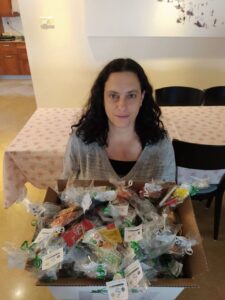
בפורים יצאנו מאפלה לאור גדול, ו”הופכות את היוצרות” מנסות לעשות את אותו הדבר עבור שורדות זנות.
בזכות קרן הפכנו שותפים למשלוחי מנות לנשים בהוסטלים ולילדיהן. מוזמנים להשתתף גם:
https://www.yotsrot.org/ for women exiting life in prostitution and sex trafficing
On Purim we came out of darkness into a great light, and “Yotsrot – Turning the Tables” try to do the same for survivors of prostitution.
Thanks to Keren, we have become partners in parcel deliveries for women in hostels and their children. You are also welcome to participate: https://www.yotsrot.org/